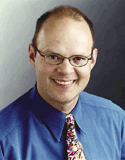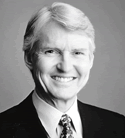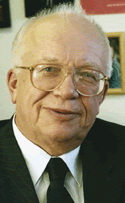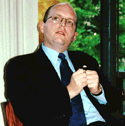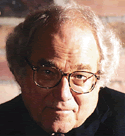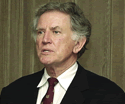
 |
||
The Yale Alumni Magazine is owned and operated by Yale Alumni Publications, Inc., a nonprofit corporation independent of Yale University. The content of the magazine and its website is the responsibility of the editors and does not necessarily reflect the views of Yale or its officers. |
After an 18-month search, the University has selected James Bundy '95MFA as the new dean of the School of Drama and artistic director of the Yale Repertory Theater. Bundy comes from the Great Lakes Theater Festival in Cleveland, where he has been artistic director since 1998. Before that, he directed the Cornerstone Theater Company and The Acting Company. He worked as an actor after graduating from Harvard in 1981 and before coming to the School of Drama to study directing. Outgoing dean Stan Wojewodski Jr. stayed on for an extra year during the dean search.
Billionaire Edward Bass '67 of Fort Worth, Texas, has been selected by the Yale Corporation to join its ranks as a successor fellow. An environmentalist best known for his involvement with the Biosphere 2 project in Arizona, Bass is also an investor, rancher, and volunteer, and he has led his family’s efforts in the redevelopment of downtown Fort Worth. In 1990, he gave the University $20 million to establish the Institute for Biospheric Studies . His brother, Sid Richardson Bass '65, was on the Corporation from 1882 to 1994.
At a Branford College master’s tea on September 25, Sergei Khrushchev, son of former Soviet leader Nikita Khrushchev, discussed Russian history before, during, and after his father’s tenure. Recalling the reaction in his home country to the Cuban Missile Crisis, Khrushchev said, “The Americans had all these elaborate plans for where they would hide out for shelter. There was no such feeling in Russia, because we knew that if war started there would be no place to go to be safe.” Khrushchev is a fellow at the Watson Institute for International Studies at Brown.
State department spokesman Philip Reeker '86 called the September 11 terrorist strikes “an attack on the entire world” at a Morse College master’s tea on October 2. “They killed Muslims, they killed Jews, they killed Canadians, and they killed Chinese,” said Reeker, who added that people from 80 countries died in the attacks. Asked how we will know if the government’s “war on terrorism” is over, Reeker said that “when we regain our confidence, when we are comfortable and secure in our own country and overseas, that will be a sign that we have defeated the terrorists.”
Twelve days after the September 11 attacks, former University Chaplain William Sloane Coffin '49, ‘56MDiv, called for restraint in America’s response. At a master’s tea in Ezra Stiles College, Coffin said the U.S. should treat the attacks as a “terrible breach of international law” and “find out exactly who is responsible and make sure that no innocent people in other countries are killed.” Coffin, who was well known on campus and beyond for his opposition to the Vietnam War, also said the best kind of patriotism often resembles a “lover’s quarrel” with one’s country.
Former Bolshoi Theater ballerina Maya Plisetkaya began a Calhoun College master’s tea on September 20 by showing a video of highlights from her classic performances with the Bolshoi. At age 75, Plisetkaya answered questions straightforwardly in Russian through a translator. About her new book, I, Maya Plisetkaya, she said simply, “I kept journals all my life. I had so much material that it became a good idea to publish it as a book.” Asked for the secret of her success, she said “I didn’t try to achieve anything. I just danced.”
Two years ago, former senator Gary Hart ’61BD, ’64LLB, spoke in Luce Hall about his work with the Hart-Rudman Commission on National Security. The commission had just issued a report that said, among other things, that Americans should expect terrorist attacks in the near future. “Americans will likely die on American soil, possibly in large numbers,” the report predicted. On October 2 and 3, Hart was back on campus, likened by Yale College dean Richard Brodhead to Cassandra, a prophet whose words were not heeded. In a lecture at Battell Chapel and a master’s tea in Berkeley College, Hart discussed terrorism as part of a larger trend in world history. “We have seen a transformation of war away from a 350-year pattern where wars were between states,” he said. “In the last ten years, we have instead seen low-intensity urban conflicts between and among factions and gangs.” Hart said the influence of the nation-state is being eaten away both from the top, through international commerce and institutions, and from the bottom by tribalism and ethnic concerns. To deal with these new realities, Hart called for an “international peacemaking force that goes into conflicts and shuts them down.” Addressing students specifically, Hart suggested that the recent attacks represent the “first crisis” of their lives and that they may want to consider careers in public service, an area where Hart says “higher-quality people” are needed. “Our country is weaker because we’re not attracting good people into public service,” he said. |
||||||||||||||||
|
|
|
|
|
|
|
|
©1992–2012, Yale Alumni Publications, Inc. All rights reserved. Yale Alumni Magazine, P.O. Box 1905, New Haven, CT 06509-1905, USA. yam@yale.edu |
||
